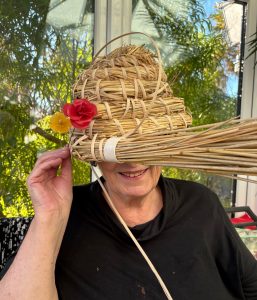Neither! And you should be ashamed of not recognising a skep-in-the-making.
This weekend gone was the National Bee convention held at Harper Adams University in darkest Shropshire. The sous-chef spent a day working on the microscope: pollen and dissected bees. I started on the skep. Think of it as a very tight, hard spiral of twisted straw, lashed together with long strands of other plant material. This is what was used in bygone years to house bees and you might recognise it from various honey labels. My skep only got as far as the crash helmet stage after 6 hours (and others in the group hadn’t even got that far). Back home with a sack of thatcher’s straw, I’ll be finishing it over the next week or so. Nowadays, some beekeepers will use skeps to gather up swarms of bees in the next few months (actually, lots use a cardboard box). But mine might end up being a cherished family heirloom.
You might have spotted the couple of flowers adorning the not-quite-bonnet. These are the results of nearly two hours hard labour turning sheets of coloured wax into fine blooms. I think that those running the course were surprised that even a blind person could manage to make them. It just goes to show that having no sight needn’t hold anyone back. On the other hand, nearly half a century ago, I was in one of the tiny Capodimonte potteries in Naples (previous life as a naval officer) where they challenged me to knock up a flower from a ball of clay – Yes, managed it.
It was a terrific event, beautifully organised with special care taken to make sure that I was safe and sound throughout. Massive thanks to Joyce and her team. The University features agricultural and associated courses (remember Ruth from The Archers went there) so the food was excellent, the dance band was outrageous and the average age was well over 50.
We also attended several lectures and the renowned Roger Patterson from West Sussex stole the days. It was a wonderful opportunity to meet fellow beekeepers (Mark and Wendy from Northern Ireland, the brace of vicars from Dorset and so many more that I can’t possibly list here). A truly wonderful opportunity to meet like-minded people, argue over the finer points of beekeeping and still enjoy each other’s company. Thumbs up to the British Beekeeping Association for another winner.

